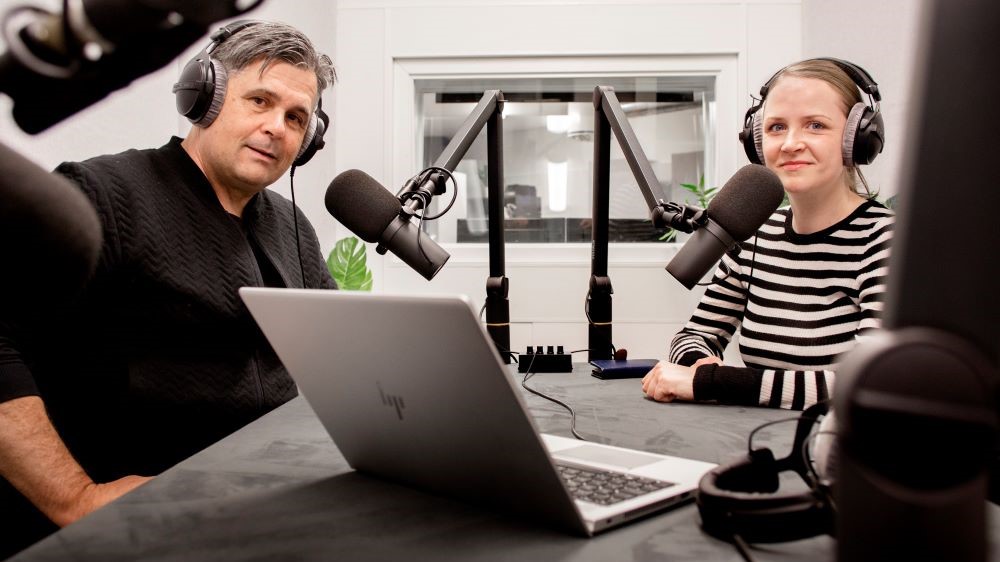This is one of two versions of the HF media dissemination course. This course trains oral communication, and the other course trains skills in written communication.
The course runs over two days, and participants must attend both days, with one hour of mandatory groupwork between:
21 May 2024, in class, 9-16
22-23 May 2024, groupwork, 1 hour
24 May, In class, 9-16
Course credits: 2 ECTS
Course credits are awarded when participants have been interviewed on radio or TV, participated in a podcast, or done a similar oral media dissemination.
The program and course work combines overview sessions on the demands and possibilities of research dissemination done on radio, podcast or TV, with working sessions that feature group work and individual feedback. You will prepare an actual media appearance, pitch your idea, and do a trial and an actual interview.
During the course, you will discuss and gain insights in the following questions:
- Why should researchers disseminate academic knowledge and what norms apply to our roles in the public sphere?
- How is dissemination in audio similar to or different from other forms of knowledge dissemination? Are there aspects to consider or specific preparations you should do?
- What considerations need to be taken into account when choosing outlets for your research? Who can benefit from it, and how much time can you devote to it?
- How should you pitch your idea to a non-academic media outlet?
- What can and should you expect as a researcher when you participate in a radio- or TV-show, a podcast, etc.?
- What does it take to make your own podcast?
Course preparations
We have a suggested reading list to support your preparation for the course.
All participants must prepare, and upload to the digital learning platform one week before the course starts, a written draft of a pitch to your chosen media outlet. It should be designed for a general-audience outlet in radio, podcast or audio on a webpage. Your may use insights specifically from your PhD project, but it is often preferable that you draw on a more general body of knowledge in your discipline.
Your pitch should include a brief teaser of 250-300 words, a set of three to four questions that you could imagine that a journalist or podcast host would ask you on this topic, and a list of ideally three potential channels (media outlet/program, with links to these), that you can approach, ranked from ideal and to less desired channel.
Two days before the course, you will be sorted into groups, and we expect you to read the draft pitch to your fellow group members.
Please bring a computer.
In between the two course days: you will work with your group members in HF’s podcast studio. On the first day of the course, the group will reserve one hour in the HF: podcast studio sometime during 22 or 23 May. Each group member records max 5 minutes each of Q&A on a topic of their own choice; you interview each other.
Make sure to upload the recording to the digital learning platform before the start of day 2 of the course.
After the course: Media dissemination
After the course, you will pitch your idea to a radio program, podcast host, editors of a web page with sound files, or similar. Course credits are awarded when participants have been interviewed on radio or tv, participated in a pod cast, or done a similar media dissemination.
The link to your dissemination is to be sent to the course leader Kjerstin Aukrust, with a copy to HF’s PhD coordinator Sarah Salameh, who will register the course, and to head of the PhD program Hanne Hagtvedt Vik.
Language
You may choose whether to carry out the public communication in English, Norwegian or another relevant language. In the course itself, joint sessions will be in English. We will aim to tailor group and individual work to each participant's language choice and needs, in English or Norwegian in the course.
Registration
Registration opens at 12.00 on 20 February.
Candidates admitted to the PhD programme at the Faculty of Humanities at UiO are given priority.
Participation in one of the versions of the media dissemination course is compulsory for candidates admitted to the PhD programme after 31 December 2022 and/or adhere to the current programme structure.
Its 2 ECTS points also cover the 2-point requirement for research dissemination for candidates adhering to the previous programme structure, which includes most of the candidates who were admitted to the PhD programme before 1 December 2023.
If you have already attended the HF media dissemination course that focus on writing skills, the ECTS credits for this course may be registered as “other courses and activities” in your educational component.
NB: Attendance is mandatory both days.
Course Convenors
Associate professor Kjerstin Aukrust, ILOS
Mari Lilleslåtten, HF communication team
Arnaud Siad, Senior Communication Adviser at PRIO
Program for Media dissemination of research – oral communication
The program will be published in the Canvas-room.
Reading list for Media dissemination of research
List of required readings will be published in the Canvas-room.
Communication and dissemination plan
Download template for communication plan (word doc)
